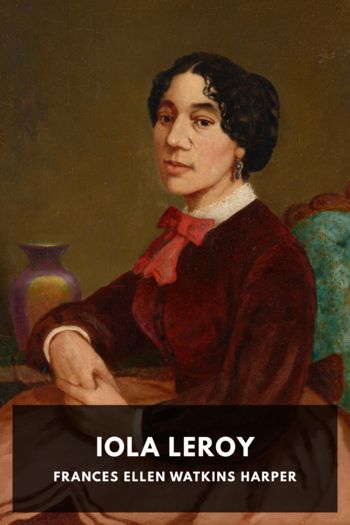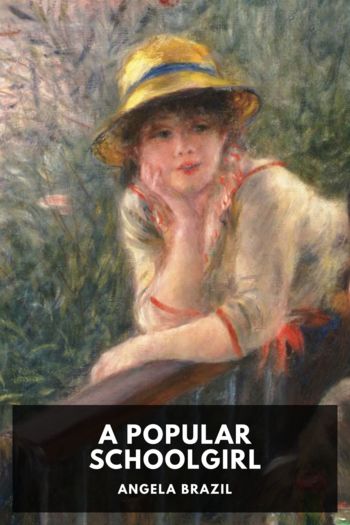Iola Leroy, Frances Ellen Watkins Harper [read aloud books .txt] 📗

- Author: Frances Ellen Watkins Harper
Book online «Iola Leroy, Frances Ellen Watkins Harper [read aloud books .txt] 📗». Author Frances Ellen Watkins Harper
Iola was not indifferent to Dr. Gresham. She admired his manliness and respected his character. He was tall and handsome, a fine specimen of the best brain and heart of New England. He had been nurtured under grand and ennobling influences. His father was a devoted Abolitionist. His mother was kindhearted, but somewhat exclusive and aristocratic. She would have looked upon his marriage with Iola as a mistake and feared that such an alliance would hurt the prospects of her daughters.
During Iola’s stay in the North, she had learned enough of the racial feeling to influence her decision in reference to Dr. Gresham’s offer. Iola, like other girls, had had her beautiful daydreams before she was rudely awakened by the fate which had dragged her into the depths of slavery. In the chambers of her imagery were pictures of noble deeds; of high, heroic men, knightly, tender, true, and brave. In Dr. Gresham she saw the ideal of her soul exemplified. But in her lonely condition, with all its background of terrible sorrow and deep abasement, she had never for a moment thought of giving or receiving love from one of that race who had been so lately associated in her mind with horror, aversion, and disgust. His kindness to her had been a new experience. His companionship was an unexpected pleasure. She had learned to enjoy his presence and to miss him when absent, and when she began to question her heart she found that unconsciously it was entwining around him.
“Yes,” she said to herself, “I do like him; but I can never marry him. To the man I marry my heart must be as open as the flowers to the sun. I could not accept his hand and hide from him the secret of my birth; and I could not consent to choose the happiest lot on earth without first finding my poor heart-stricken and desolate mother. Perhaps some day I may have the courage to tell him my sad story, and then make my heart the sepulchre in which to bury all the love which might have gladdened and brightened my whole life.”
During the sad and weary months which ensued while the war dragged its slow length along, Dr. Gresham and Iola often met by the bedsides of the wounded and dying, and sometimes he would drop a few words at which her heart would beat quicker and her cheek flush more vividly. But he was so kind, tender, and respectful, that Iola had no idea he knew her race affiliations. She knew from unmistakable signs that Dr. Gresham had learned to love her, and that he had power to call forth the warmest affection of her soul; but she fought with her own heart and repressed its rising love. She felt that it was best for his sake that they should not marry. When she saw the evidences of his increasing love she regretted that she had not informed him at the first of the barrier that lay between them; it might have saved him unnecessary suffering. Thinking thus, Iola resolved, at whatever cost of pain it might be to herself, to explain to Dr. Gresham what she meant by the insurmountable barrier. Iola, after a continuous strain upon her nervous system for months, began to suffer from general debility and nervous depression. Dr. Gresham saw the increasing pallor on Iola’s cheek and the loss of buoyancy in her step. One morning, as she turned from the bed of a young soldier for whom she had just written a letter to his mother, there was such a look of pity and sorrow on her face that Dr. Gresham’s whole heart went out in sympathy for her, and he resolved to break the silence he had imposed upon himself.
“Iola,” he said, and there was a depth of passionate tenderness in his voice, a volume of unexpressed affection in his face, “you are wronging yourself. You are sinking beneath burdens too heavy for you to bear. It seems to me that besides the constant drain upon your sympathies there is some great sorrow preying upon your life; some burden that ought to be shared.” He gazed upon her so ardently that each cord of her heart seemed to vibrate, and unbidden tears sprang to her lustrous eyes, as she said, sadly:—
“Doctor, you are right.”
“Iola, my heart is longing to lift those burdens from your life. Love, like faith, laughs at impossibilities. I can conceive of no barrier too high for my love to surmount. Consent to be mine, as nothing else on earth is mine.”
“Doctor, you know not what you ask,” replied Iola. “Instead of coming into this hospital a self-sacrificing woman, laying her every gift and advantage upon the altar of her country, I came as a rescued slave, glad to find a refuge from a fate more cruel than death; a fate from which I was rescued by the intervention of my dear dead friend, Thomas Anderson. I was born on a lonely plantation on the Mississippi River, where the white population was very sparse. We had no neighbors who ever visited us; no young white girls with whom I ever played in my childhood; but, never having enjoyed such companionship, I was unconscious of any sense of privation. Our parents spared no pains to make the lives of their children (we were three) as bright and pleasant as they could. Our home was so happy. We had a large number of servants, who were devoted to us. I never had the faintest suspicion that there was any wrongfulness in slavery, and I never dreamed of the dreadful fate which broke in a storm of fearful anguish over our devoted heads. Papa used to take us to New Orleans to see the Mardi Gras, and while there we visited the theatres and other places of amusement and interest. At home we had books, papers, and magazines to beguile our time. Perfectly





Comments (0)